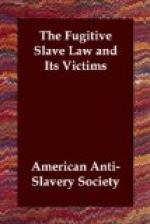appear,] were made to arrest the murderous gang,
but they had departed from the place. BILL
then waded some distance up the stream, and “was
found by some women flat on his face in a corn-field.
They carried him to a place of safety, dressed his
wounds,” and the suffering man was seen no more
in Wilkesbarre.—Correspondence
of New York Tribune.
Wynkoop and another were afterwards arrested in Philadelphia, on a charge of riot, the warrant issuing from a State magistrate of Wilkesbarre, on the complaint of William C. Gildersleeve, of the place. Mr. Jackson, the constable who held them in custody, was brought before Judge Grier, of the United States Supreme Court, by habeas corpus. Judge Grier, during the examination, said:—
“I will not have the officers of the United States harassed at every step in the performance of their duties by every petty magistrate who chooses to harass them, or by any unprincipled interloper who chooses to make complaints against them—for I know something of the man who makes this complaint.” “If this man Gildersleeve fails to make out the facts set forth in the warrant of arrest, I will request the Prosecuting Attorney of Luzerne County to prosecute him for perjury. * * * If any tuppenny magistrate, or any unprincipled interloper can come in, and cause to be arrested the officers of the United States, whenever they please, it is a sad affair. * * * If habeas corpuses are to be taken out alter that manner, I will have an indictment sent to the United States Grand Jury against the person who applies for the writ, or assists in getting it, the lawyer who defends it, and the sheriff who serves the writ. * * * I will see that my officers are protected.” On a subsequent day, Judge Grier gave an elaborate opinion, reciting the facts in the case, as stated by the prisoners, and ordering them to be discharged! He said:—“We are unable to perceive, in this transaction, anything worthy of blame in the conduct of these officers in their unsuccessful endeavors to fulfil a most dangerous and disgusting duty; except, perhaps, a want of sufficient courage and perseverance in the attempt to execute the writ!”
Wynkoop and the other were discharged by Judge Kane on the ground that they did only what their duty, under the Law, required. (May, 1854.)
A family of colored persons, at Uniontown, Pa., were claimed as slaves by a man in Virginia. They admitted that they had been his slaves, but declared that they had come into Pennsylvania with their master’s consent and knowledge, on a visit to some friends in Fayette County, and were not, therefore, fugitives. This was overruled, and the negroes were sent back by a United States Commissioner, name not given. (September, 1853.)[A]—Pittsburgh Saturday Visiter.
[Footnote A: A correspondent of the New York Evening Post, writing




